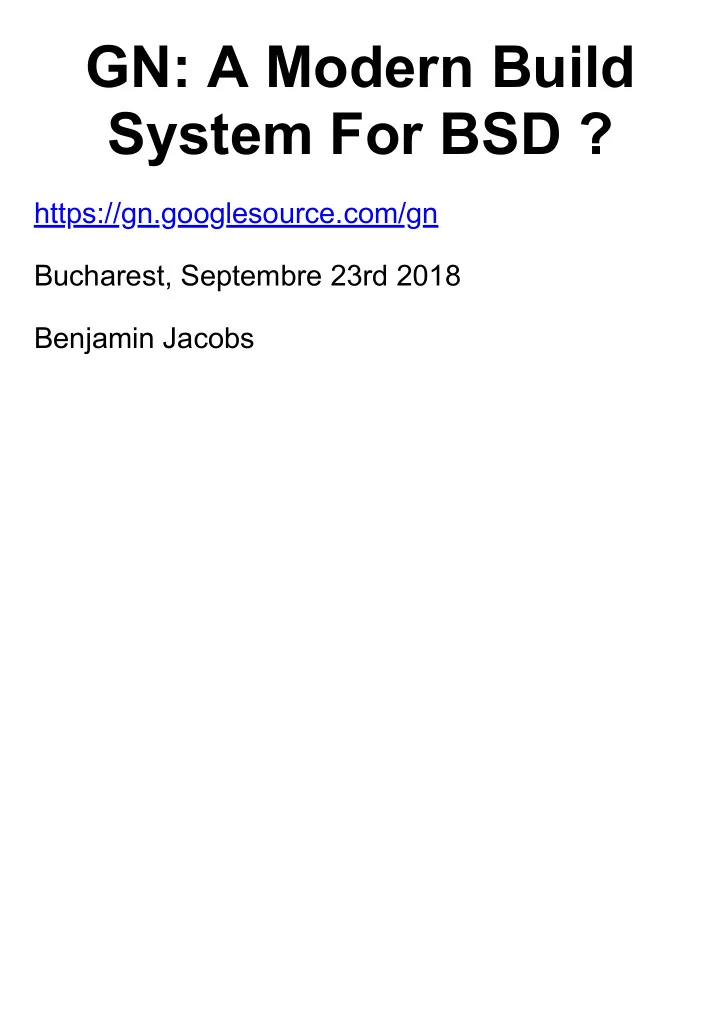

GN: A Modern Build System For BSD ? https://gn.googlesource.com/gn Bucharest, Septembre 23rd 2018 Benjamin Jacobs
(Original) Motivation As an easy way to import LLVM into DragonFlyBSD base Under a (naive) assumption, given that: Upsream LLVM uses CMake which generates Ninja files GN generates Ninja files ~-> With little effort it could be possible to merge both (?)
What is GN ? Developped at Google to replace Gypp Used to build the chromium browser and the chrome OS since 2016 Generates Ninja files Can also generate VS and XCode projects Used to live inside the chromium repository C++ code base Uses 200+ C++ file from base and platform support libraries of chromium + libevent 3.8MB all statically linked 3-Clause BSD License
(And Ninja?) «It is designed to have its input files generated by a higher-level build system, and it is designed to run builds as fast as possible.» (https://ninja-build.org/) Computes the dependency graph and executes the commands used to update inexisting or outdated target Also updates a target when the command has been changed, e.g. modifying CFLAGS. Some well known generators: CMake, meson. Apache License 2.0
What Could Be a Modern Build System? Performant* Correct Easy to use and still powerful enough But more importantly, hard to misuse Extensible ? *: See http://gittup.org/tup/ Mike Shal's paper (2009)
For BSD? Open source license Community support Portable C/C++ codebase Better cross-compilation support Your answer at the end?
GN's Language gn help grammar Simple C-like syntax Booleans, integers, strings and (nestable) lists variables Primitive expressions: value substitution, list concatenation, logical, … Primitive control structures: foreach (iterator, list) {...} and if (expr) {...} Limited path substitution functions, e.g. to construct path relative to the build directory Script can be run at the evaluation/generation stage whose output can be used by GN itself. Note: The language is evaluated, however the separation imposed between the generation phase and the compilation/building phase makes it "mostly declarative".
GN's Language (continued) Higher-level elements: targets configurations args: build knobs (versus /etc/default/make.conf) toolchains template: macro-like construction, e.g. Hygenic and strict variable propagation and scoping rules Import (versus make's #include )
Only a Handful of Target Declaration Types Builtin types: It is not possible to define arbitrary rules like Make's wildcard rules ( sys.mk )! Strictly tailored towards the C language: executable loadable_module shared_library static_library source_set : like a static library without the intermediary linking step, to be used as dependency A toolchain provides the actual command to be run The action / action_foreach targets can call out to an external command. This is mostly used to replace inline sh/sed/awk rules generating files.
More Targets action / action_foreach : run an external script macOS specifics file copy group: meta target
Toolchain Definition gn help toolchain / gn help tool Compiling tools: "cc", "cxx", "objc", "objcxx", "rc", "asm" Linking tools: "alink", "solink", "link" There must be a single "default" toolchain defined but a target can be build using another one When it is the case, all the dependency graph will be duplicated using the other toolchain GN determines the compiler to be used by looking at the file extension (hardcoded) Causes an issue with .c files which really need to be compiled in C++ mode, e.g. binutils's gold.
Target configuration elements Hold include directories, defines, compiler *flags, an inputs dependencies. Can be specified on the target element or can be named and referenced by targets using configs , public_configs or all_dependent_configs . config ("xxx_config") { includes = [ ".", "//contrib/xxx/include" ] defines = [ "HAVE_FOO" ] } target ("executable" ) { ... configs = [":xxx_config"] } Config are merged together: include directories, cflags public_configs or all_dependent_configs also apply to direct dependent, or transitively to all dependent's dependents. Help avoiding the proliferation of those unnecessary or redundant - I../../path/ and -Ddefines GN Goodie: header check mode: search for C #include "file" , where the include search directory wouldn't have been provided explicitely or implicitely by transitive dependencies.
Args, and Special Variables or Functions target_gen_dir , target_out_dir , get_target_outputs() . rebase_path() Whose values vary with the current toolchain
GN file locations, labels and references Label are use to reference target, dependencies, or config. 3 kind of reference: /absolute/target:name , relative/target:name and //root- of-sources/relative/target:name references. Looks for a name target defined in the target/BUILD.gn file. Alternate hierachy is possible, to avoid cluttering the tree with BUILD.gn files.
Optimistic demonstration
Final Words and Feedback It is all about lowering the burden of maintaining build scripts. What is your experience ?
Recommend
More recommend